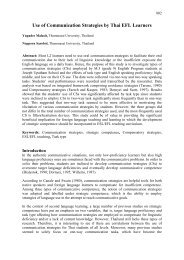The Effects of Semantic Mapping on Vocabulary Memorizing
The Effects of Semantic Mapping on Vocabulary Memorizing
The Effects of Semantic Mapping on Vocabulary Memorizing
Create successful ePaper yourself
Turn your PDF publications into a flip-book with our unique Google optimized e-Paper software.
3. <strong>Memorizing</strong> word meaning<br />
3.1. Short-term and l<strong>on</strong>g-term memory<br />
Cognitive psychologists divide memory into short-term and l<strong>on</strong>g-term memory according to<br />
durati<strong>on</strong> <str<strong>on</strong>g>of</str<strong>on</strong>g> memory retenti<strong>on</strong> and capacity <str<strong>on</strong>g>of</str<strong>on</strong>g> recalling informati<strong>on</strong> after the original input.<br />
L<strong>on</strong>g-term memory retains informati<strong>on</strong> for use in anything but the immediate future. Short-term<br />
memory is used to store or hold informati<strong>on</strong> while it is being processed. <str<strong>on</strong>g>The</str<strong>on</strong>g> object <str<strong>on</strong>g>of</str<strong>on</strong>g><br />
vocabulary learning is to transfer the lexical informati<strong>on</strong> from the short-term memory to the<br />
more permanent l<strong>on</strong>g-term memory (Schmitt, 2000).<br />
According to Gairns and Redman (1986), l<strong>on</strong>g-term memory is seemingly inexhaustible and can<br />
accommodate any amount <str<strong>on</strong>g>of</str<strong>on</strong>g> informati<strong>on</strong>. It is generally acknowledged that we need to work<br />
much harder to commit informati<strong>on</strong> to l<strong>on</strong>g-term memory, and the type <str<strong>on</strong>g>of</str<strong>on</strong>g> repetiti<strong>on</strong> that is<br />
essential to short-term retenti<strong>on</strong> may not be adequate for l<strong>on</strong>g-term retenti<strong>on</strong>. However, the<br />
distincti<strong>on</strong> between short-term retenti<strong>on</strong> and l<strong>on</strong>g-term retenti<strong>on</strong> is not always clear-cut.<br />
Informati<strong>on</strong> entering short-term memory may pass quite effortlessly into l<strong>on</strong>g-term memory, and<br />
some learners may find repetiti<strong>on</strong> a very effective way <str<strong>on</strong>g>of</str<strong>on</strong>g> transferring informati<strong>on</strong> into l<strong>on</strong>g-term<br />
memory.<br />
When learning vocabulary, learners <str<strong>on</strong>g>of</str<strong>on</strong>g>ten have problems with retenti<strong>on</strong> <str<strong>on</strong>g>of</str<strong>on</strong>g> words for a l<strong>on</strong>g time.<br />
<str<strong>on</strong>g>The</str<strong>on</strong>g>y usually fail to put the words into l<strong>on</strong>g-term memory. In the present study, short-term<br />
memory is c<strong>on</strong>sidered as the initial memory <str<strong>on</strong>g>of</str<strong>on</strong>g> the word meaning at the end <str<strong>on</strong>g>of</str<strong>on</strong>g> the less<strong>on</strong>s<br />
whereas the number <str<strong>on</strong>g>of</str<strong>on</strong>g> words can be recalled at the next less<strong>on</strong>s or at the end <str<strong>on</strong>g>of</str<strong>on</strong>g> the study is<br />
referred as <strong>on</strong>es from l<strong>on</strong>g -term memory because the participants in the study have <strong>on</strong>ly three<br />
forty-five-minute less<strong>on</strong>s per week.<br />
3.2. Major factors affecting word memorizati<strong>on</strong><br />
<str<strong>on</strong>g>The</str<strong>on</strong>g>re are various reas<strong>on</strong>s why students remember some words better than others: nature <str<strong>on</strong>g>of</str<strong>on</strong>g> the<br />
words themselves, situati<strong>on</strong>s under which the words are learnt, how the words are taught to<br />
students and so <strong>on</strong>. Gairns and Redman (1986) showed that learning new items involves storing<br />
them first in the short-term memory and afterwards in the l<strong>on</strong>g-term memory, and the l<strong>on</strong>g-term<br />
memory can hold any amount <str<strong>on</strong>g>of</str<strong>on</strong>g> informati<strong>on</strong>. <str<strong>on</strong>g>The</str<strong>on</strong>g>y stated that our “mental lexic<strong>on</strong>” is highly<br />
organized and efficient, and that semantic related items are stored together. Word frequency is<br />
another factor that affects storage, as the most frequently used items are easier to retrieve. We<br />
can use this informati<strong>on</strong> to facilitate the leaning process by grouping items <str<strong>on</strong>g>of</str<strong>on</strong>g> vocabulary in<br />
semantic fields such as topics.<br />
Besides, storing informati<strong>on</strong> is not the <strong>on</strong>ly difficulty faced by the learners when learning<br />
vocabulary; then, retrieval is another <strong>on</strong> which the present research is centered. Nunan (1990)<br />
shared the idea that learners can be encouraged to develop their own pers<strong>on</strong>al learning styles for<br />
vocabulary, in such areas as memorizing and retaining new words. However, Cater et al. (1989)<br />
assured that the storage <str<strong>on</strong>g>of</str<strong>on</strong>g> informati<strong>on</strong> does not guarantee its retrieval. Learners need ways to<br />
increase the probability that retrieval cues will be effective, just as they need techniques that will<br />
permit the recall <str<strong>on</strong>g>of</str<strong>on</strong>g> words that are appropriate for the situati<strong>on</strong>. Cater also pointed out techniques<br />
that enhance producti<strong>on</strong> will have to be centered <strong>on</strong> the meanings <str<strong>on</strong>g>of</str<strong>on</strong>g> words rather than <strong>on</strong> their<br />
forms because most <str<strong>on</strong>g>of</str<strong>on</strong>g> our producti<strong>on</strong> has to do with searching for an appropriate meaning to fit<br />
632






